Welcome to Moda Fabrics!
Entering Quilt Shows: "You Never Know Until You Try"
Entering Quilt Shows: "You Never Know Until You Try"
Feeling judged. It’s kind of a downer, isn’t it? Unless you're talking about quilt shows.
That’s because there’s much to be learned by screwing up your courage, entering a show, and letting your work be subjected to scrutiny. So say quilters Christa Watson and Judy Adams.
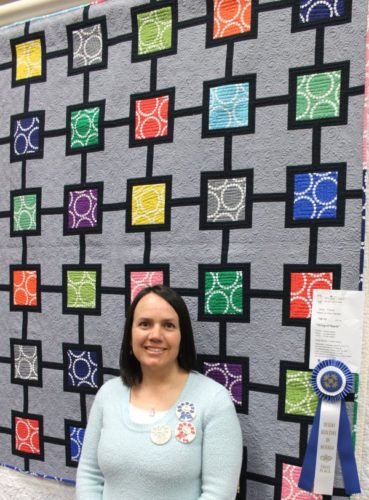 Christa Watson with her String of Pearls quilt that won first place at her local Desert Quilters of Nevada show in 2014 and her first national quilt show ribbon, Honorable Mention, at the MQX Pacific Northwest Show in 2013.
Christa Watson with her String of Pearls quilt that won first place at her local Desert Quilters of Nevada show in 2014 and her first national quilt show ribbon, Honorable Mention, at the MQX Pacific Northwest Show in 2013.
Christa is the author of Machine Quilting with Style and the co-author with Angela Walters of The Ultimate Guide to Machine Quilting: Long-Arm and Sit-Down. So with those kinds of credentials you might think “Well of course she enters quilt shows, she’s a professional.” And it’s true, she is and she does enter shows because it provides exposure to quilters who might not know about the other things she does (like leaving her Las Vegas home to travel around the country, teaching and lecturing). But she got her quilt show start at the local level, entering events put on by her local guild. “I’ve been a member for 20 years, and I’ve learned so much from them,” she says. “I entered their shows for 17 or more years—it was just three years ago that I entered my first national show.” She’s since won ribbons for her quilts at Road to California, MQS Quilt Festival, and AQS shows in Paducah.
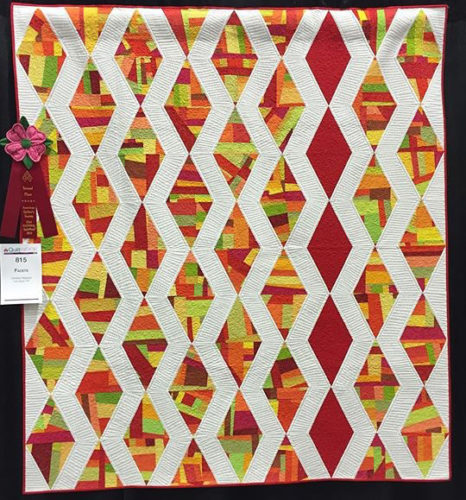 Christa's quilt from her Machine Quilting with Style book earned ribbons at both the MQX Quilt Festival Midwest 2016 and the AQS Quiltweek, Paducah 2016 shows.
Christa's quilt from her Machine Quilting with Style book earned ribbons at both the MQX Quilt Festival Midwest 2016 and the AQS Quiltweek, Paducah 2016 shows.
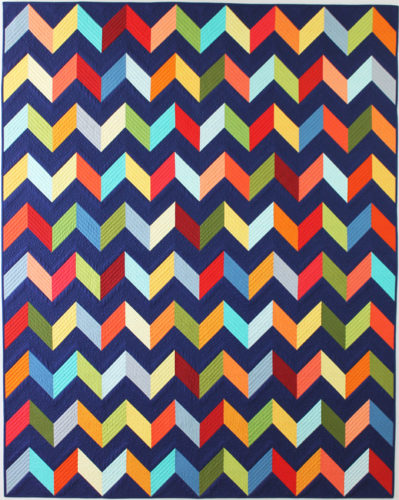 Christa's Colorful Chevrons earned three ribbons: at the MQX Quilt Festival Midwest in 2014, the DQN Quilt Show, Las Vegas in 2015, and the AQS Quilt Show in Paducah, 2014. It was the first quilt she entered in a national show—QuiltCon, 2013—and she was ecstatic that it was juried in. "Although I didn't win a ribbon, it taught me a lot about entering national quilt shows," she says. "This quilt later led to my first published quilt design in a national magazine, which then led to me writing books and teaching nationally."
Christa's Colorful Chevrons earned three ribbons: at the MQX Quilt Festival Midwest in 2014, the DQN Quilt Show, Las Vegas in 2015, and the AQS Quilt Show in Paducah, 2014. It was the first quilt she entered in a national show—QuiltCon, 2013—and she was ecstatic that it was juried in. "Although I didn't win a ribbon, it taught me a lot about entering national quilt shows," she says. "This quilt later led to my first published quilt design in a national magazine, which then led to me writing books and teaching nationally."
Judy Adams is an Arizona quilter who’s won many ribbons, all at the local level.
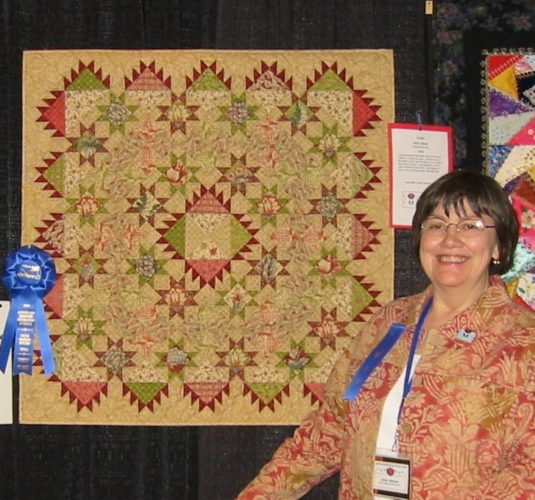 Judy Adams with her blue-ribbon-winning small version of Elizabeth by Miss Rosie's Quilt Company in 2006.
Judy Adams with her blue-ribbon-winning small version of Elizabeth by Miss Rosie's Quilt Company in 2006.
She entered her first quilt show as part of a group effort, when Moda’s own Carrie Nelson got a group together for a log cabin stash challenge. Someone suggested that the final quilts, which were wildly different, would make a great display in the Arizona quilt show. That introduction to sharing her quilts publicly was enough to hook Judy. “It was really exciting to see it hanging there—it wasn’t being judged, but it was so much fun I decided I’d do it again the next year,” she says. That following year she bravely submitted quilts for judging and received second place and honorable mention ribbons, along with a ribbon for best use of color for her Starburst quilt. “I don’t think I’d ever won a prize or award before and I was stunned,” she says. “That gives you the bug to try again.”
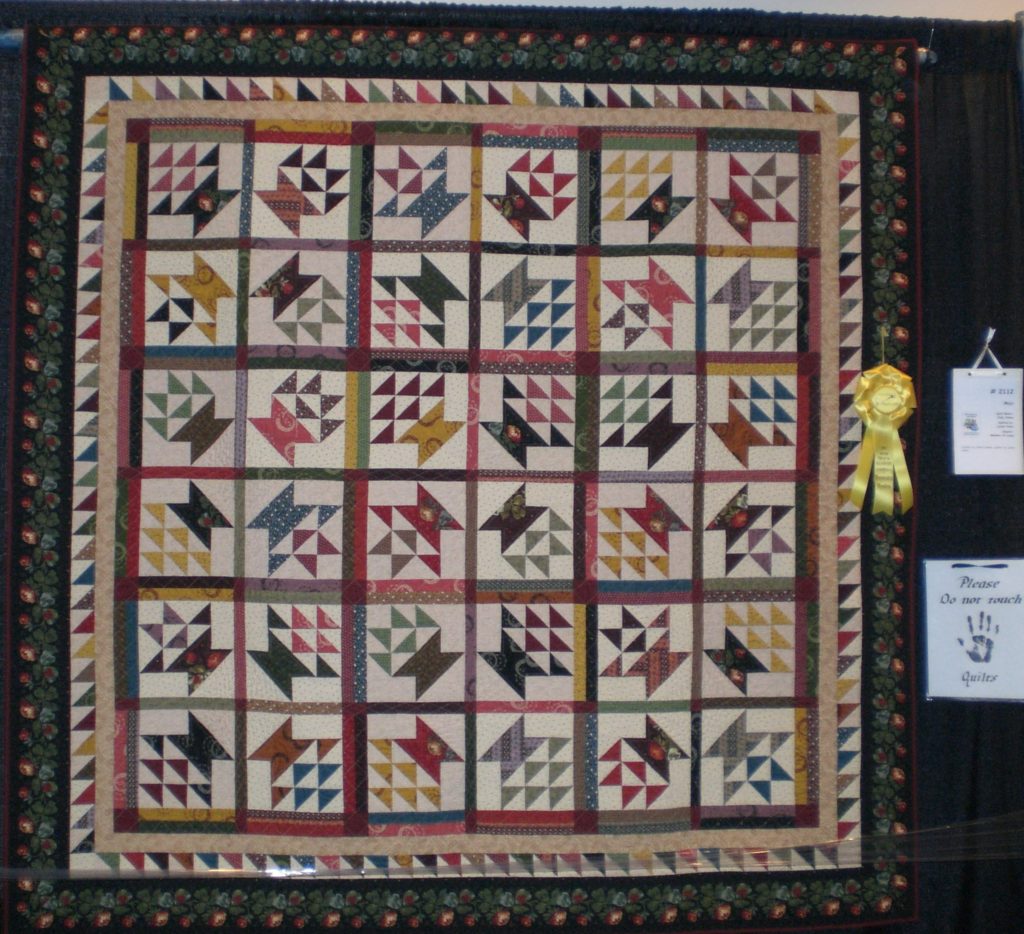 Judy's winning quilt Mojo from 2007. Pattern by Miss Rosie’s Quilt Co., machine quilted by Louise Haley
Judy's winning quilt Mojo from 2007. Pattern by Miss Rosie’s Quilt Co., machine quilted by Louise Haley
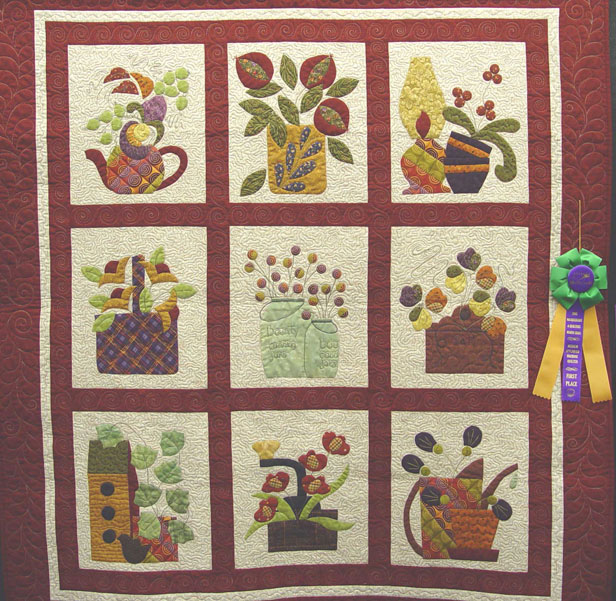 Judy's hand-appliquéd quilt Pieces of Time was honored in 2005. Country Gathering pattern by Linda Yantis, machine quilted by Gina Perkes
Judy's hand-appliquéd quilt Pieces of Time was honored in 2005. Country Gathering pattern by Linda Yantis, machine quilted by Gina Perkes
Both Judy and Christa agree that the place to start is at local shows. “You can really sink your teeth in at the local level and build confidence,” says Christa. Many guilds hold shows, some juried, some not. [My guild holds a “church pew show” every other year, where members are welcome to bring in quilts they’ve made to display across the pews of a large sanctuary—no judging is involved.] But making the leap to enter a juried show provides another benefit. “Even if you don’t win a ribbon, you’re going to get feedback from the judge and that will help you improve your quilting,” says Judy. Christa also says that entering shows helps her set deadlines. “It gives me a goal to shoot for and incentive to finish,” she says.
 Christa modern remake of her Puzzle Box quilt pattern earned her second place in Machine Quilting the Modern way at the MQX Quilt Festival New England in 2016. "But just because it got an award at one show is no guarantee it will ribbon at another," she says. "It's been in another national show where it didn't win anything, and was not even juried in to another. Getting judged or juried into shows is very subjective, but I'm ok with that, because you never know until you try!"
Christa modern remake of her Puzzle Box quilt pattern earned her second place in Machine Quilting the Modern way at the MQX Quilt Festival New England in 2016. "But just because it got an award at one show is no guarantee it will ribbon at another," she says. "It's been in another national show where it didn't win anything, and was not even juried in to another. Getting judged or juried into shows is very subjective, but I'm ok with that, because you never know until you try!"
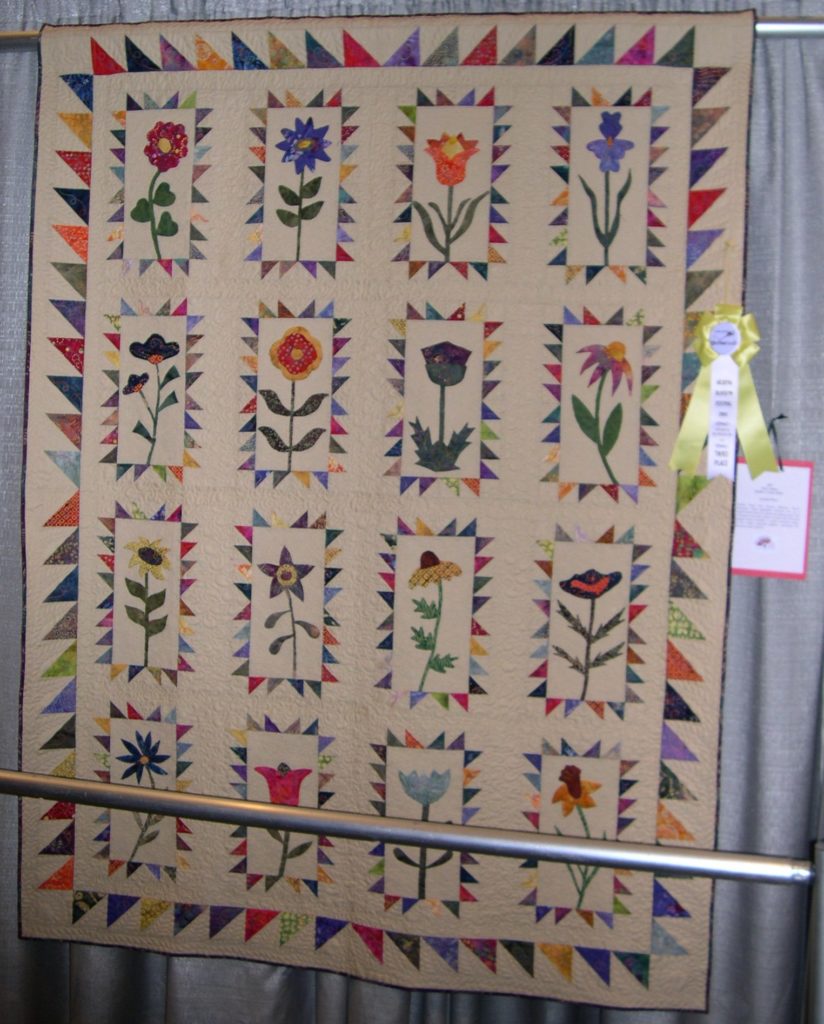 In 2004 Judy stitched this award-winning hand-appliquéd quilt. Garden Party. Garden of Stitches pattern by Lisa Bongean, machine quilted by Louise Haley
In 2004 Judy stitched this award-winning hand-appliquéd quilt. Garden Party. Garden of Stitches pattern by Lisa Bongean, machine quilted by Louise Haley
Judy and Christa both cite volunteering to help behind-the-scenes at shows as a great learning experience. Volunteer jobs include unwrapping and laying quilts out, holding quilts up, and taking notes based on the judges’ comments. In juried shows judging is “blind,” meaning that the judge doesn’t know whose quilt they’re looking at when they examine them. Quilts are typically inspected flat on a table and then raised vertically by volunteers so the judge can stand back to get an overall impression. Judges may ask for some quilts to be “held,” and at the end of the category the “held” quilts are typically lifted side-by-side so that the judge can decide between them and award ribbons. Along the way, volunteers hear judges commenting on making sure bindings are full and borders needing to be straight, tips that might help them improve their own skill set.
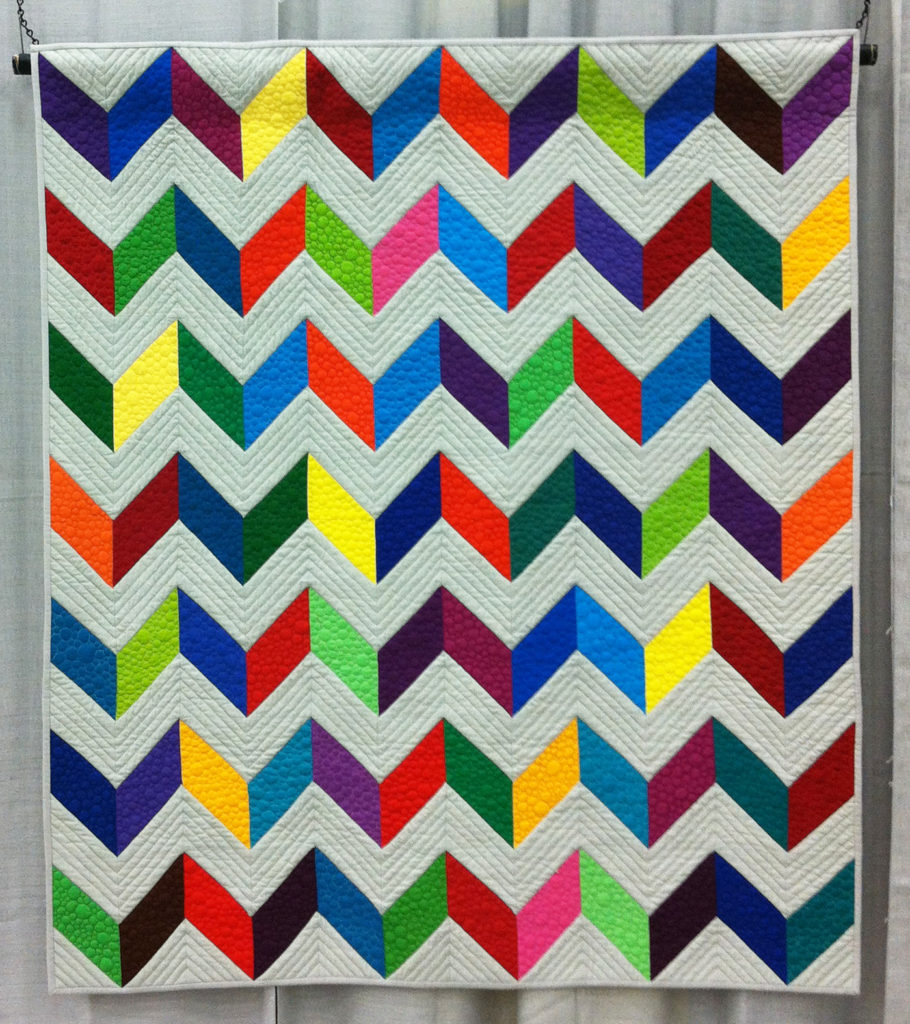 Christa took suggestions given to her by the judges from QuiltCon and remade this Charming Chevrons quilt, which went on to win a 3rd place ribbon in the modern category at AQS Paducah in 2014, plus ribbons at a few other shows.
Christa took suggestions given to her by the judges from QuiltCon and remade this Charming Chevrons quilt, which went on to win a 3rd place ribbon in the modern category at AQS Paducah in 2014, plus ribbons at a few other shows.
Moving from local to national shows requires yet another leap of faith, and Christa acknowledges that social media has changed that scenario. On one hand, she learns about new and different shows when she sees a post on Instagram of someone working to finish a quilt to enter. But the downside is seeing all the quilts that get accepted to a show when her quilt doesn’t. “It’s important to remember you’re not seeing the whole picture, all the other quilts that didn’t get in,” she says. “It’s cool and amazing to get a quilt accepted to a national show, but most of the time you won’t get in and people shouldn’t feel terrible if their work isn’t accepted or they don’t get a ribbon.” One of the smallest juried national shows, QuiltCon, has possibly the largest following on social media. Recent social media chatter led Christa to write a blog post about quilt shows, which you can read here. (It also led to the hashtag #quiltconreject, where it’s evident that if your quilt wasn’t accepted, you are in excellent company.)
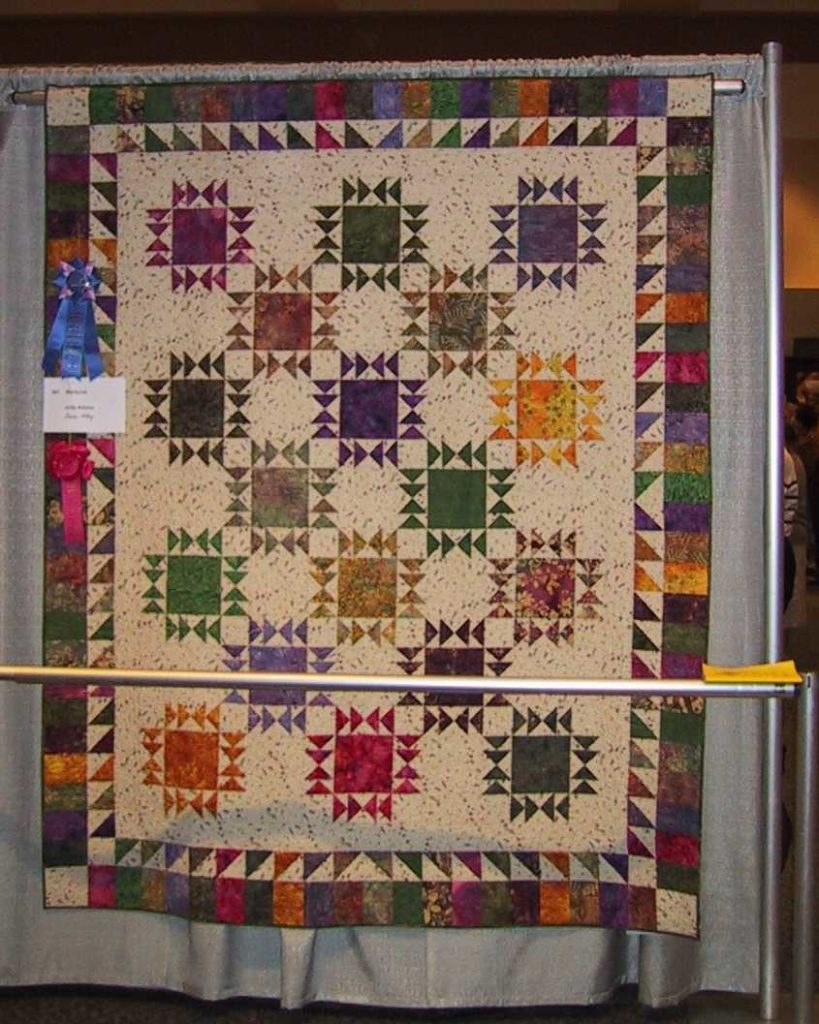 One of the first quilts Judy entered in a juried show, this Starburst quilt won second prize in its category, plus another ribbon for best use of color in 2002. Pattern by Debbie Caffrey, pieced, machine quilted by Louise Haley.
One of the first quilts Judy entered in a juried show, this Starburst quilt won second prize in its category, plus another ribbon for best use of color in 2002. Pattern by Debbie Caffrey, pieced, machine quilted by Louise Haley.
But back to local shows, which is where most quilters cut their teeth. Judy Adams has some advice for those who are hesitant to enter. “If you’re nervous or think you’re not good enough, you’re the one who should be entering. People already know that well-known quilters are good. But entering and seeing your quilt hanging in a show can do so much for first-time entrants, like it did for me. It’s been so fun, and made me a better quilter.”

Comments